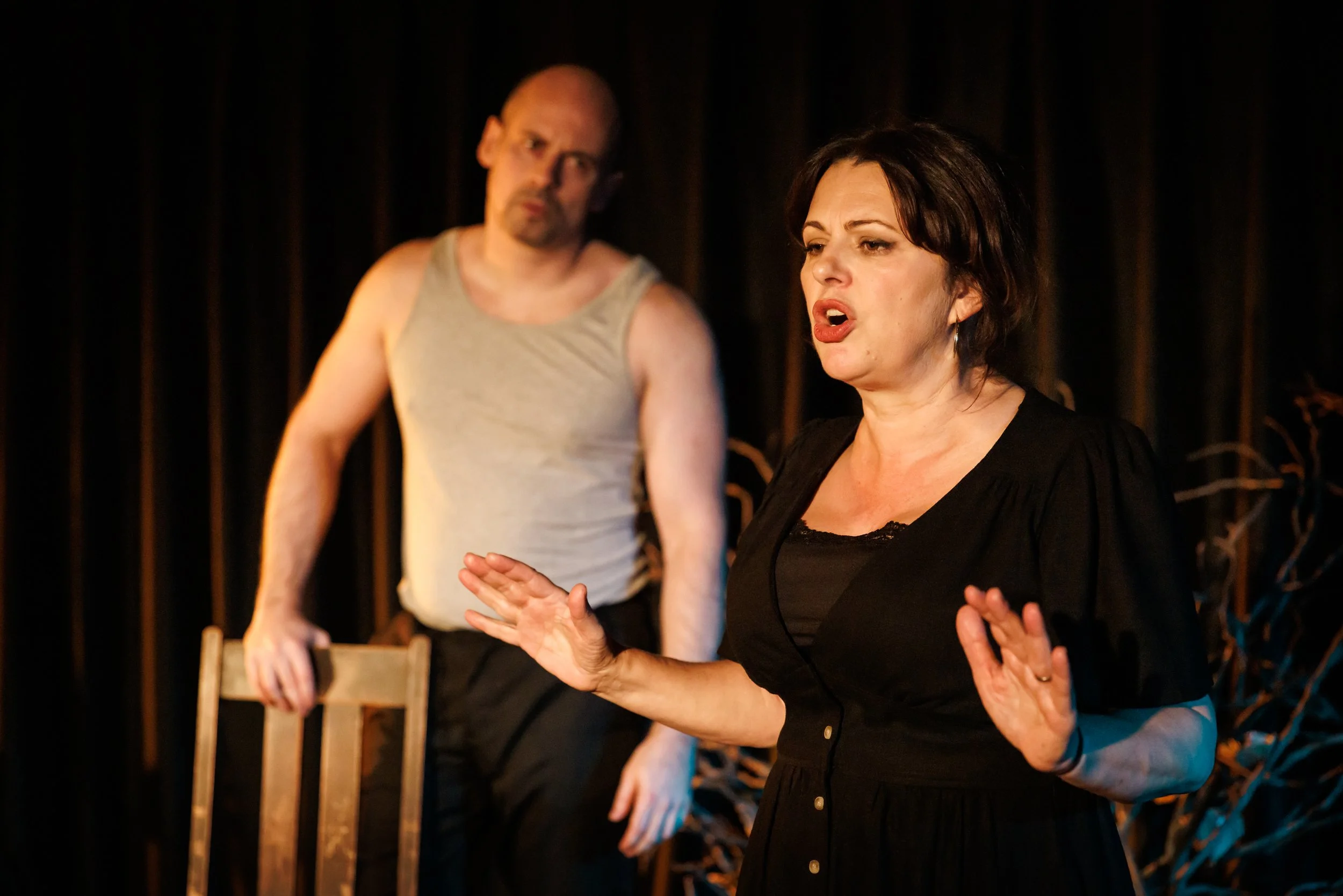REVIEW: The Bitter Fruits of Belonging in I Topi Non Avevano Nipoti
I Topi Non Avevano is a stageplay written, directed and produced by Roman Flowers Theatre, and presented as part of La Mama’s Festival of Mother Tongues between 17 - 19 November at CO.AS.IT (Museo Italiano).
Language: Italian
Performed by: Rosa Nix, Nores Cerfeda, Susie Paterno
Directed by: Luca Romani
Produced by: Roman Flowers Theatre
Reviewed by: Monica Sestito
Susie Paterno and Nores Cerfeda star in I Topi Non Avevano Nipoti. Presented as part of La Mama’s Festival of Mother Tongues. Image by Darren Gill.
“Per fare tutto ci vuole un fiore” (to do anything you need a flower). So recites the matriarchal figure of I Topi Non Avevano Nipoti (The Mice Had No Grandchildren) in an extended funeral sequence mourning her son, who she seems to have smothered to death with her overbearing presence. She references a poem by Gianni Rodari, later put to music by Sergio Endrigo and transformed into one of the most famous Italian nursery rhymes. The absurd sequence captures a core contradiction explored in the play: how family norms can both create and constrict life, planting its seeds and containing its flourishing.
I Topi Non Avevano Nipoti is produced by the Roman Flowers Theatre Company and performed within the walls of CO.AS.IT, one of the institutional centrepieces of the Italian-Australian community. It features as a part of La Mama Theatre’s Festival of Mother Tongues, an inaugural season of multilingual theatre produced and performed by culturally and linguistically diverse artists. The play stages a series of vignettes that loosely trace the challenges faced by Italian immigrants to Australia in negotiating cultural mores that venerate parochialism and paternalism as the binding threads of familial and community connections.
Rosa Nix stars in I Topi Non Avevano Nipoti. Presented as part of La Mama’s Festival of Mother Tongues. Image by Darren Gill.
As its writer and director Luca Romani explained in a recent interview, the show aims to probe the impacts of a “culture of prudence” on social relations––something which its leading actors (Susie Paternò, Nores Cerfeda and Rosa Nix), who all share Italian cultural backgrounds, are well situated to explore. According to Romani, Paternò assailed him with the same questions about the intergenerational transmissibility of ‘Italian-ness’ that, unbeknownst to her, were already written for her to perform in one of the play’s most politically loaded scenes. This uncanny coincidence speaks volumes of the way in which the play’s frank and tightly structured dialogues re-present learnt cultural scripts about belonging and ‘proper’ familial and social roles.
Sometimes, these cultural scripts invite benign laughter, as happens in one scene when an all-knowing Italy-based mother lambasts her Melbourne-based daughter for the crime of feeding her newborn a piece of broccoli “senza olio” (without oil) and identifies in this unseasoned vegetable the ultimate symbol of Australia’s cultural impoverishment. Cerfeda here plays the role of the spoon-fed newborn with comedic deftness, in what appears as a perfect complement to his earlier enactment of a teenage “mammone” (mother’s boy). At other points, such as when a hyper-present mother chastises her son for pursuing women his age instead of waiting until he's a “signore” who can command and control younger women, the familiarity only begets discomfort. One of the strengths of the script lies in this oscillation between levity and stark solemnity, even if it at times strains the emotional and conceptual threads between scenes.
The minimalistic set design, with the stage largely stripped bare, facilitates the play’s movements in time (from Rome in the 1970s to Melbourne today) and space (from a café to the home). There is, however, one important exception. Barren branches frame the performance space at the front and back, as if to offer a constant visual reminder of challenges faced by the play’s protagonists to cultivate life amidst and against arid familiar and cultural expectations. I Topi Non Avevano Nipoti is an ambitious, if at times uneven, production that is to be credited for audaciously probing the simultaneously sustaining and stifling nature of received familial and cultural norms.
This review is part of MAV’s initiative to foster culturally responsive theatre criticism, amplifying diverse voices and perspectives in the arts. By inviting writers, storytellers and artists to review the works of fellow creatives through the lens of shared lived, or cultural experiences, we aim to highlight the importance of theatre reviews that challenge dominant narratives and provide deeper, culturally grounded perspectives.


